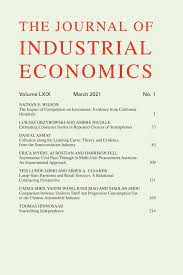JOURNAL OF INDUSTRIAL ECONOMICS
Número:
1
Publicado:

Lo más reciente
Bernardo Romero-Torres, Gerson Javier Pérez-Valbuena, Andrés Felipe García-Suaza, Jaime Alfredo Bonet-Moron
Olga Lucia Acosta Navarro, Andrés Felipe Chitán-Caes, Ana María Iregui-Bohórquez, Ligia Alba Melo-Becerra, María Teresa Ramírez-Giraldo, Jorge Leonardo Rodríguez Arenas
Alejandro Ome, Laura Giles Álvarez, Gerson Javier Pérez-Valbuena, Cristhian Larrahondo
This article analyzes the effects of broadband carriers switching from price discrimination to uniform pricing. Broadband carriers often use third-degree price discrimination. In Colombia, broadband carriers rely on government-issued socio-economic information to segment markets. I use demand and marginal cost estimates to quantify the effects of switching from price discrimination to uniform pricing in an environment of high income disparity. The results provide direct evidence of large consumer surplus transfers from poorer to wealthier households. Poorer households respond by subscribing to slower Internet plans, which may undermine prior efforts to increase download speeds in this demographic.
